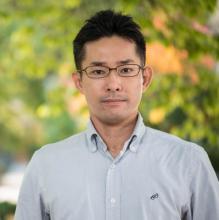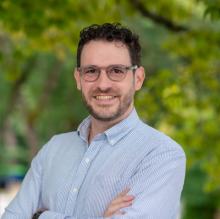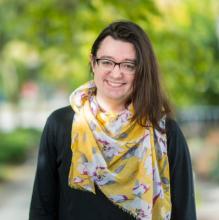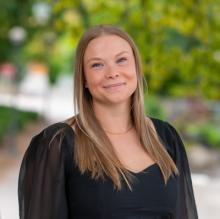My doctoral research at UBC focuses on constructing a transformational, orthogonal relationship between literacy and numeracy through philosophy of mathematics and science, English literature, and creative writing. One of my goals is to produce creative fiction that inspires readers to embrace and explore math as curious amateurs and to question how numbers tell stories.
Research Description
I bristle when friends tell me they hate math. I understand math phobia, and I agree that math lessons can be difficult and obtuse and intimidating, especially when your high school trigonometry teacher is also the football coach. Despite my own anxiety and middling grades, I learned to love math for its profoundly mysterious, beautiful, and elevating nature. However, as an amateur, I found I had little expertise to share this love with others. Before coming to UBC, I worked as a technical communicator, writing about technological and scientific ideas for diverse audiences. I was finishing a master’s degree at Skidmore College in upstate New York, exploring new ways to use figurative language and storytelling in technical communication when, thanks to a professor with an innovative interpretation of Don Quixote, I discovered an unexpected, compelling counterpart to my research: there were works of literature that wove together threads of scientific and mathematical thought. Sometimes those strands were obvious, but often they were the barest of connections, buried deep in plot and character and form. I found these narratives especially exciting – they revealed the innate human curiosity about mathematics through rich, imaginative storytelling. They presented a new way to think mathematically, a new way of figuring that disrupted acceptance of literacy and numeracy as opposites nurtured in separate hemispheres of the brain or as disciplines sequestered in different buildings on campus. My doctoral research at UBC focuses on constructing a transformational, orthogonal relationship between literacy and numeracy through philosophy of mathematics and science, English literature, and creative writing. One of my goals is to produce creative fiction that inspires readers to embrace and explore math as curious amateurs and to question how numbers tell stories. With mathematical curiosity we can enhance STEM curricula, certainly, but we can also challenge access to and participation in other social and cultural numerical systems – like economies – which can become exclusionary and secretive simply because many people are led to assume the math is too difficult.
What does being a Public Scholar mean to you?
Being a Public Scholar means that I’m part of a nurturing, supportive community that also challenges and critiques my ideas. The network comprises a diversity of scholars working with so many dynamic communities – what an opportunity to humbly contribute and learn and share. Public Scholars also provides a safe place to take risks, where I can learn from the mistakes or misperceptions that are inevitable when exploring and experimenting with ideas and intersections.
In what ways do you think the PhD experience can be re-imagined with the Public Scholars Initiative?
Public Scholars nurtures real interdisciplinarity. It’s not just about crossing academic boundaries, which is crucial, of course, but also about the kind of rarefied thinking that changes how and why we use boundaries or barriers in the first place. We can reimagine what scholarship does, not just what it is, and how it affects all communities: how does it elevate, resonate with, or infringe upon? Those are the questions that invigorate academia, inspire scholars to take a consensual step forward or a pause to reflect; to take a step back to recalibrate assumptions or to venture down the path of a missed opportunity. With this ethos, PhD research becomes animate and evolving, not just a series of checkbox steps toward mastery of pre-defined knowledge.
How do you envision connecting your PhD work with broader career possibilities?
I had always pictured my PhD dissertation as a combination of critical and creative work that would open up new possibilities. With Public Scholars, I can participate in meaningful, collaborative community outreach to test and assess the value of my hypotheses, making my work more meaningful for me and, hopefully, more useful to others. This experience expands my career potential as a writer and communicator, but also as an educator and facilitator, equipped to build connections or see common ground where it may not be obvious.
How does your research engage with the larger community and social partners?
I currently write for the literary blog Bloom, which highlights authors who publish after the age of 40. My feature, called Go Figure, explores the connections between mathematics and literature; it has allowed me to strike up a two-way conversation with writers, mathematicians, and readers in an open and spontaneous way. I’m hoping to expand the feature to include contributing writers who are examining fiction as a vehicle for other key scientific concerns, like climate change. In the summer of 2020, I’m planning to work with students and scholars to learn how to use the mathematical concepts that underpin complex systems research as figures and metaphors in my novel-in-progress. For the future, I envision working with mathematics educators to enhance curriculum development; learning from Indigenous communities about their underrepresented mathematical scholarship; collaborating with community art centers to craft creative writing workshops as avenues toward building mathematical cognition, skill, curiosity, experimentation, and play; and serving as a writer-in residence at a scientific think tank.
Why did you decide to pursue a graduate degree?
I dropped out of college at the age of 18, after one lackluster semester. After working as a bank teller and bartender, secretary and paste-up artist (a pre-digital role in publishing!), I finally went back to school at age 25. I enrolled in a pre-engineering curriculum at my local community college where I met two professors – one taught calculus and the other poetry – who inspired me to continue my education, despite the obstacles. My calculus professor was eclectic and quirky – he was ambidextrous and would write long equations on the board using both hands. Then, covered in chalk and brimming with glee, he would address the whole class: “Do you get it Pookie?!” I got it – not just the solution to the equation, but the joy of mathematics. My poetry professor saw I had potential for straddling the “two cultures” – I wrote poetry about scientific processes, like fluid mosaic phospholipid transport in biological cells. I owe both of them a huge debt, for encouraging my interdisciplinary thinking and for showing me I had the intellectual stamina to continue my education as a nontraditional, mature student.
Why did you choose to come to British Columbia and study at UBC?
I wanted to continue the work I’d begun in my master’s degree exploring the intersections between literature and mathematics. I loved the interdisciplinary or liberal studies approach, but had trouble finding a PhD-level program in the United States. There were only a few, and none of them was a good fit for my research goals. I learned about UBC’s Interdisciplinary Studies Graduate Program (ISGP) from a colleague who was working and studying at Simon Fraser University. I researched the program and quickly learned that at UBC I could learn to be creatively and intellectually ambidextrous, working with both hands simultaneously, integrating both sides of my brain. Now, as a Public Scholar, I can find ways to share and hone my work with the community and public partners, adding another dimension of rigor and insight to my research.
Being a Public Scholar means that I’m part of a nurturing, supportive community that also challenges and critiques my ideas. The network comprises a diversity of scholars working with so many dynamic communities – what an opportunity to humbly contribute and learn and share.




